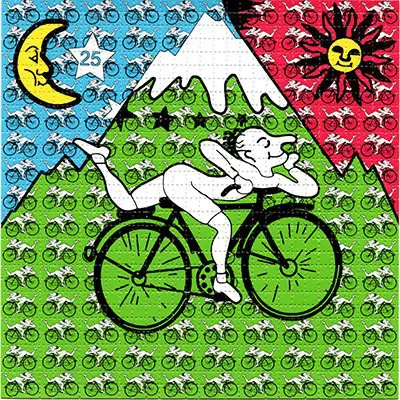Buy Lsd Online. LSD (lysergic acid diethylamide), first synthesized in 1938, is an extremely potent hallucinogen. It is synthetically made from lysergic acid, which is found in ergot, a fungus that grows on rye and other grains. It is so potent its doses tend to be in the microgram range. It affects, often called a “trip” can be stimulating, pleasurable, and mind-altering or it can lead to n unpleasant, sometimes terrifying experience called a “bad trip.
LSD is produced in crystalline form and then mixed with other inactive ingredients, or diluted as a liquid for production in ingestible forms. It is odorless, colorless, and has a slightly bitter taste.
$300/sheets.
Buy LSD 220ug Sheets
LSD does not appear to be addictive, although tolerance may occur with the use of increasing doses. Adverse psychiatric reactions are possible, such as anxiety, paranoia, and delusions. Distressing flashbacks might occur in spite of no further use, a condition called hallucinogen persisting perception disorder. Death is very rare as a result of LSD, though it occasionally occurs in accidents.
The effects of LSD are believed to occur as a result of alterations in the serotonin system. As little as 20 micrograms can produce an effect. In pure form, LSD is clear or white in color, has no smell, and is crystalline. It breaks down with exposure to ultraviolet light. Lysergic acid diethylamide (LSD), also known as acid, is a hallucinogenic drug.
Effects typically include altered thoughts, feelings, and
awareness of one’s surroundings. Many users see or hear things that do not exist. Dilated pupils, increased blood pressure, and increased body temperature are typical. Effects typically begin within half an hour and can last for up to 12 hours. It is used mainly as a
recreational drug and for spiritual reasons.
About 10 percent of people in the United States have used LSD at some point in their lives as of 2017, while 0.7 percent have used it in the last year. It was most popular in the 1960s to 1980s. LSD is typically either swallowed or held under the tongue. It is most often sold on blotter paper and less commonly as tablets or in gelatin squares. There is no known treatment for addiction if it occurs.
LSD was first made by Albert Hofmann in 1938 from lysergic acid, a chemical from the fungus ergot. Hofmann discovered its hallucinogenic properties in 1943. In the 1950s, the Central Intelligence Agency (CIA) believed that the drug might be useful for mind control, so they tested it on people, some without their knowledge, in a program called MKUltra.
LSD was sold as a medication for research purposes under the trade-name Delysid in the 1950s and 1960s. It was listed as a schedule 1 controlled substance by the United Nations in 1971. It currently has no approved medical use. In Europe, as of 2011, the typical cost of a dose was between $4.34 and $29.65.
blotter paper (LSD soaked onto sheets of absorbent paper with colorful designs; cut into small, individual dosage units). The most common form.
thin squares of gelatin (commonly referred to as window panes)
tablet form (usually small tablets known as Microdots) or capsules
liquid on sugar cubes
the pure liquid form (maybe extremely potent)
Uses of LSD
Recreational
LSD is commonly used as a recreational drug.
Spiritual
LSD is considered an entheogen because it can catalyze intense spiritual experiences, during which users may feel they have come into contact with a greater spiritual or cosmic order. Users sometimes report out-of-body experiences. In 1966, Timothy Leary established the League for Spiritual Discovery with LSD as its sacrament. Stanislav Grof has written that religious and mystical experiences observed during LSD sessions appear to be phenomenologically indistinguishable from similar descriptions in the sacred scriptures of the great religions of the world and the texts of ancient civilizations.
Medical
LSD currently has no approved uses in medicine. A meta-analysis concluded that a single dose was effective at reducing alcohol consumption in alcoholism. LSD has also been studied in depression, anxiety, and drug dependence, with positive preliminary results.
Effects of LSD Use
LSD is a mind-altering drug. Serotonin receptors in the brain react with LSD to cause its hallucinogenic effects. Serotonin is a neurotransmitter that helps control your behavior and mood, governs your senses, and moderates your thoughts.
The physical effects of LSD are unpredictable from person to person, and no one knows if they will have a good or bad “trip.”. Usually, the first effects of the drug when taken by mouth are felt 30 to 45 minutes after ingestion while its peak at 2 to 4 hours. Use by the intravenous (IV) route will produce a much quicker action, usually within 10 minutes. Effects include:
hallucinations.
distorted visual perception of shapes, colors.
altered sounds.
anxiety and depression.
rapid heart rate, increased body temperature, and high blood pressure
dilated pupils.
Extreme changes in mood can occur. If taken in large enough doses, the drug produces delusions and visual hallucinations. Overdose can lead to severe psychosis while death is often due to a direct injury while under LSD influence. There is no known lethal dose of LSD.

